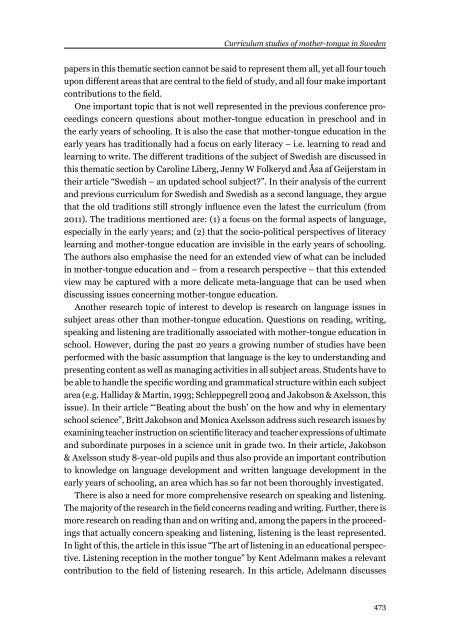Download issue - Lärarutbildning - Umeå universitet
Download issue - Lärarutbildning - Umeå universitet
Download issue - Lärarutbildning - Umeå universitet
You also want an ePaper? Increase the reach of your titles
YUMPU automatically turns print PDFs into web optimized ePapers that Google loves.
Curriculum studies of mother-tongue in Sweden<br />
papers in this thematic section cannot be said to represent them all, yet all four touch<br />
upon different areas that are central to the field of study, and all four make important<br />
contributions to the field.<br />
One important topic that is not well represented in the previous conference proceedings<br />
concern questions about mother-tongue education in preschool and in<br />
the early years of schooling. It is also the case that mother-tongue education in the<br />
early years has traditionally had a focus on early literacy – i.e. learning to read and<br />
learning to write. The different traditions of the subject of Swedish are discussed in<br />
this thematic section by Caroline Liberg, Jenny W Folkeryd and Åsa af Geijerstam in<br />
their article “Swedish – an updated school subject?”. In their analysis of the current<br />
and previous curriculum for Swedish and Swedish as a second language, they argue<br />
that the old traditions still strongly influence even the latest the curriculum (from<br />
2011). The traditions mentioned are: (1) a focus on the formal aspects of language,<br />
especially in the early years; and (2) that the socio-political perspectives of literacy<br />
learning and mother-tongue education are invisible in the early years of schooling.<br />
The authors also emphasise the need for an extended view of what can be included<br />
in mother-tongue education and – from a research perspective – that this extended<br />
view may be captured with a more delicate meta-language that can be used when<br />
discussing <strong>issue</strong>s concerning mother-tongue education.<br />
Another research topic of interest to develop is research on language <strong>issue</strong>s in<br />
subject areas other than mother-tongue education. Questions on reading, writing,<br />
speaking and listening are traditionally associated with mother-tongue education in<br />
school. However, during the past 20 years a growing number of studies have been<br />
performed with the basic assumption that language is the key to understanding and<br />
presenting content as well as managing activities in all subject areas. Students have to<br />
be able to handle the specific wording and grammatical structure within each subject<br />
area (e.g. Halliday & Martin, 1993; Schleppegrell 2004 and Jakobson & Axelsson, this<br />
<strong>issue</strong>). In their article “‘Beating about the bush’ on the how and why in elementary<br />
school science”, Britt Jakobson and Monica Axelsson address such research <strong>issue</strong>s by<br />
examining teacher instruction on scientific literacy and teacher expressions of ultimate<br />
and subordinate purposes in a science unit in grade two. In their article, Jakobson<br />
& Axelsson study 8-year-old pupils and thus also provide an important contribution<br />
to knowledge on language development and written language development in the<br />
early years of schooling, an area which has so far not been thoroughly investigated.<br />
There is also a need for more comprehensive research on speaking and listening.<br />
The majority of the research in the field concerns reading and writing. Further, there is<br />
more research on reading than and on writing and, among the papers in the proceedings<br />
that actually concern speaking and listening, listening is the least represented.<br />
In light of this, the article in this <strong>issue</strong> “The art of listening in an educational perspective.<br />
Listening reception in the mother tongue” by Kent Adelmann makes a relevant<br />
contribution to the field of listening research. In this article, Adelmann discusses<br />
473

















